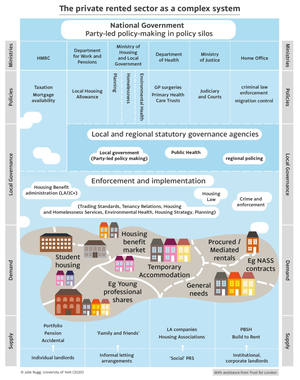The Private Rented Sector (PRS) is an increasingly complex part of the housing market, and thanks to rapid change and growth outpacing councils' ability to regulate, parts have become somewhat of a 'Wild West'.
This report from the Centre for Housing Policy at the University of York and funded by Trust for London and the Oak Foundation follows on from the national picture, and looks at how London local authorities can take a more strategic approach to managing the Private Rented Sector, to disrupt exploitative practices and ensure that the sector feels governed. Research is based on conversations with London boroughs' officers.
With 27% of London's households now living in the Private Rented Sector, there is an increasing need to ensure that regulation is in place and consistent. But pressure has been put upon local authority teams due to austerity, loss of experienced staff, and such rapid growth. Meanwhile legislation has not kept pace with the scale of the changes leaving gaps or confusion around, for example, 'rent-to-rent' schemes and short term lets.
- The PRS is a complex system of sub-markets, segmented by different types of landlord and tenant demand. At the lower end, some rentals are procured or mediated by government agencies/contractors and charities.
- Regulation of the sector is highly siloed at both national and local levels, with major disconnects between enforcement, homelessness and planning teams.
- Political will is a challenge, with councillors on both sides of the political spectrum not giving priority to the Private Rented Sector.
- Some landlords and letting agents are exploiting gaps and grey areas in the law, as well as councils’ limited resources to inspect and challenge bad practice.
It is possible to move towards a more strategic approach to managing the Private Rented Sector. Councils can achieve a lot to improve the sector within existing resources, especially if they have backing from local politicians, and the experiences of London boroughs indicated this.
Suggestions on how to frame a strategic approach are:
- Define broad objectives for intervention - management of the sector can contribute to wider council goals, around improving well-being or reducing poverty.
- 'Know what you know' - understand what is known about the local PRS including stories and statistics, across different teams and the voluntary sector.
- 'Know what you do' - audit local authority and service interventions in the market across all services.
- Audit enforcement powers - look at the regulatory and enforcement powers currently in operation and consider what might be under-used.
- 'Where are the gaps? Who should be in the room?' - assess what or who can be brought in. For example, the voluntary sector can help with knowledge, lobbying politicians, and providing specialist services to councils.

17 February 2020